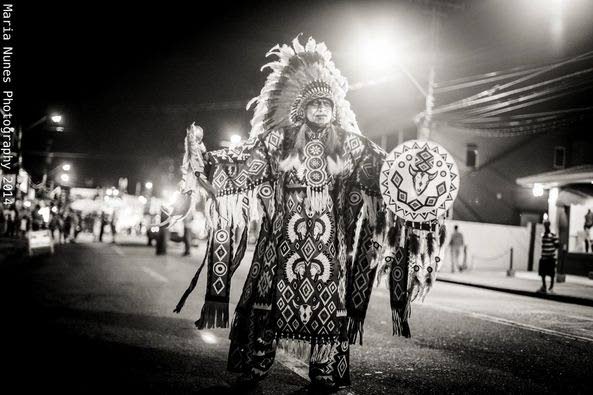The Indian mas king

DR GABRIELLE JAMELA HOSEIN
WITH EQUAL parts gratitude and grief, I write today to honour the memory of veteran Fancy Indian masman Lionel Jagessar.
At Carnival time, his spirit grew large in the way that only masmakers can, rising from humble surroundings to become a giant on the stage and the road. You could know him as Uncle Lio, plain-speaking and soft-spoken, until you saw him swaying under bright lights or hot sun. Then, he was only and entirely his mas; transformed by a costume he spent months creating in the mas camp that was his second home.
I met Lio in 2004 as a student completing PhD research in San Fernando on Trinidadian conceptions of authority. He and his family, Rose Marie Kuru-Jagessar, Larry, Lisa and Junior, embraced me like one of their own, tolerantly answering my questions, though the answers were so obvious to a family that lived and breathed mas, and patiently showing me how to cut and glue triangles of cloth to skirts and shawls.
For about a year and a half, I spent many hours in the mas camp, taking notes from Lio’s stories. In costume, he was a warrior. In person he was gentle, jokey and considerate. He was generous with anyone interested in listening.
Lighting one cigarette after another, he would show me how he sewed beadwork and point out familiar patterns in past costumes. He’d stand reflecting on his drawing and designs, describing how the family chose themes and colours, and drew from books in their library.
He’d reminisce about his early days in mas with elder masmen and how they would battle with calls and chants on the road, smiling as he remembered being named Sitting Bull. He’d get frustrated at how little government listened to masmakers as they competed for who had most right to determine Carnival’s routes, prizes and rules. He’d look out for me, asking about my safety as I traversed the trainline, and market and mosque on Mucurapo Street, collecting data.
He’d affectionately placate his beloved wife, bandleader and queen, Rose Marie, as she fretted about returning from town with enough leatherette for all the mas players or feeding those hanging about rather than helping in the mas camp.

She had to look after all these things, she’d tell me, from the purchasing to the cooking to dancing the costume as the light-footed royalty she was on stage. She took it all on with a firm, fearsome and matriarchal hand because of, in her words, “love for my culture, mas and my husband.”
As my ethnography of San Fernando unfolded, I began to understand the Jagessars’ love for mas. It wasn’t just about playing a mas or being a mas player. It was about making mas and dedicating your life, family and livelihood to the sacrifice, spirit and work it required.
This was what allowed masmen like Lionel to carry more authority in Carnival than those in City Hall. People respected his labour of love, his leadership as bandleader and his status as king.
Playing with the band in San Fernando, I watched Lionel surrounded by serious, authentic Indian masmen and women, lieutenants gathered from all over south Trinidad with their home-made traditional weapons, painted faces, beadwork, moccasins and headdresses, some fresh from a foreday morning bush bath. For them, like Lio, like the Jagessars, Indian mas was sacred, a thing of beauty and pride.
I learned to see them as a dispersed community with a sense of history and lineage, a cosmology and belief system about warriorhood, and complex and skilled art that adorned their bodies on Carnival days, and which they carried in necklaces or wristbands like a sign of identity and belonging throughout the year.
In the years since, my gratitude remained for this tight-knit, Indo-Trinidadian, Hindu family, ensconced in their extended network, surrounded by bits and pieces of past and future costumes, full of personality, creativity and stamina, and determined to come to town and win from South.
At this centre of this world was Lionel Jagessar, without whom I wouldn’t have written a PhD and who I carry until today with all the love for a father-figure in my heart.
Lionel was adored by his family, but by so many more, including those loyal to the band each year. We mourn together across the nation, though we know that his legacy will live on. May his great spirit dance, as he did his king mas, in the boundless beyond.
Diary of a mothering worker
Entry 479
motheringworker@gmail.com



Comments
"The Indian mas king"